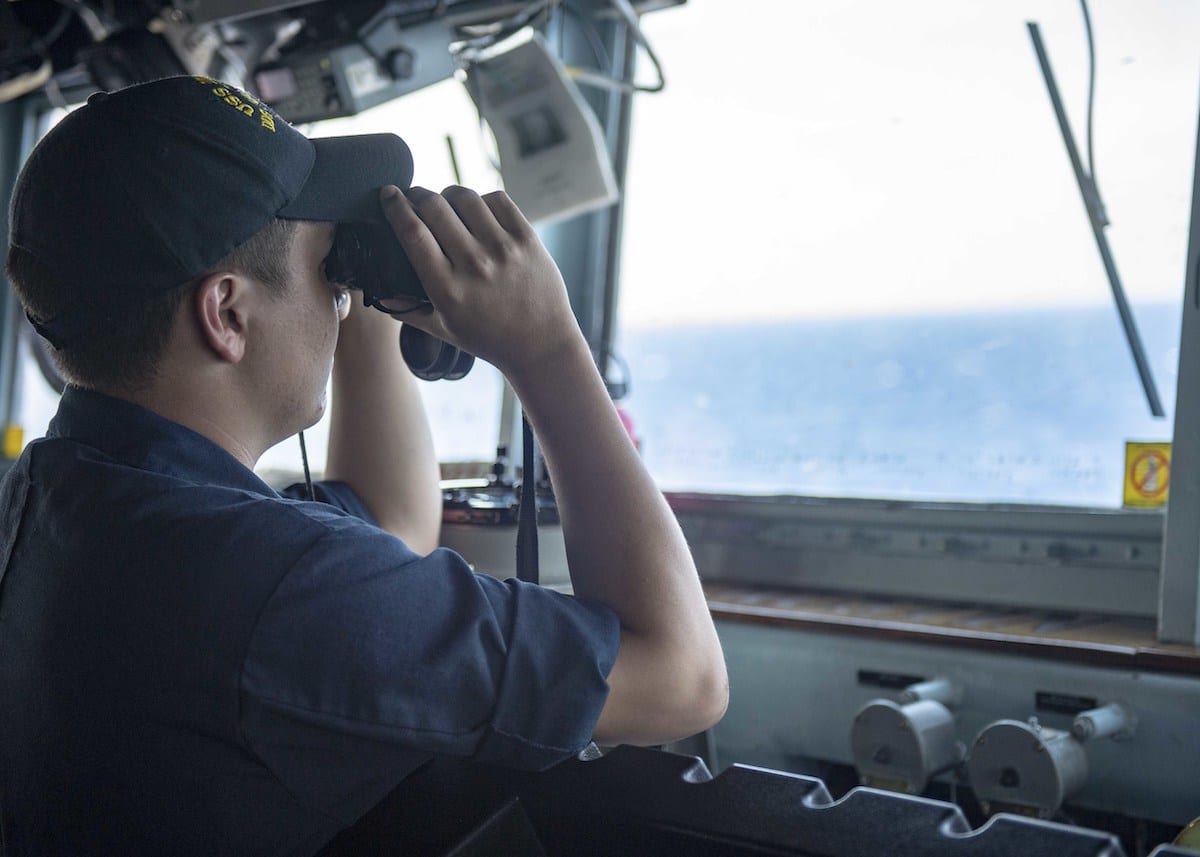An ensign assigned to the the Arleigh Burke-class guided-missile destroyer USS Mustin (DDG 89), looks through binoculars during routine operations in the South China Sea, August 25, 2020. U.S. Navy Photo

By Ben Blanchard Aug 27 (Reuters) – The United States and China traded jibes as military tensions grow between the world’s two largest economies, with the U.S. defense chief vowing not to “cede an inch” in the Pacific and China saying Washington was risking soldiers’ lives.
Both are at loggerheads over issues from technology and human rights to Chinese military activities in the disputed South China Sea, with each accusing the other of deliberately provocative behavior.
In the latest U.S. move against China ahead of November’s presidential election, Washington on Wednesday blacklisted 24 Chinese companies and targeted individuals over construction and military actions in the busy South China Sea waterway.
On Thursday, a U.S. Navy warship carried out a routine operation near the Paracel Islands in the South China Sea, something frequently criticized by Beijing as threatening its sovereignty.
In Hawaii, U.S. Defense Secretary Mark Esper said the ruling Chinese Communist Party (CCP) wanted Beijing to project power globally via its military.
“To advance the CCP’s agenda, the People’s Liberation Army (PLA) continues to pursue an aggressive modernization plan to achieve a world class military by the middle of the century,” Esper said.
“This will undoubtedly involve the PLA’s provocative behavior in the South and East China Seas, and anywhere else the Chinese government has deemed critical to its interests.”
However, Esper said the United States wanted to “hopefully continue to work with the People’s Republic of China to get them back on a trajectory that is more aligned with the international rules based order.”
Speaking before a regional tour, Esper described the Indo-Pacific as the epicenter of a “great power competition with China.”
He added, “We’re not going to cede this region, an inch of ground if you will, to another country, any other country that thinks their form of government, their views on human rights, their views on sovereignty, their views on freedom of the press, freedom of religion, freedom of assembly, all those things, that somehow that’s better than what many of us share.”
President Donald Trump’s administration has repeatedly bashed China over issues including its handling of the coronavirus, a common theme during this week’s Republican National Convention.
In Beijing, China’s Defense Ministry shot back at “certain U.S. politicians” it said were damaging Sino-U.S. military ties in the run-up to the November election for their own selfish gain, even seeking to create military clashes.
“This kind of behavior puts the lives of frontline officers and soldiers on both sides at risk,” spokesman Wu Qian told reporters at a monthly briefing on Thursday.
China is not scared of “provocation and pressure” from the United States, and will resolutely defend itself and not allow the United States to cause trouble, he added.
“We hope the U.S. side will truly adopt a strategic vision, view China’s development with an open and rational attitude, and leave behind the quagmire of anxiety and entanglement.”
The tension has sparked fears of accidental conflict.
A U.S. defense official told Reuters on Wednesday that China had launched four medium-range ballistic missiles that hit the South China Sea between Hainan Island and the Paracel Islands.
On Thursday, the Pentagon said it was concerned about China’s recent military exercises, including the firing of the missiles.
“Conducting military exercises over disputed territory in the South China Sea is counterproductive to easing tensions and maintaining stability,” the Pentagon said in a statement.
It added that the U.S. military had told Chinese authorities in July that it would continue to monitor the situation with “the expectation that the PRC (People’s Republic of China) will reduce its militarization and coercion of its neighbors in the South China Sea.”
(Reporting by Ben Blanchard in Taipei; Additional reporting by Cate Cadell, Yew Lun Tian in Beijing and Idrees Ali in Washington; Editing by Cynthia Osterman and Rosalba O’Brien)
(c) Copyright Thomson Reuters 2020.

 Join The Club
Join The Club











